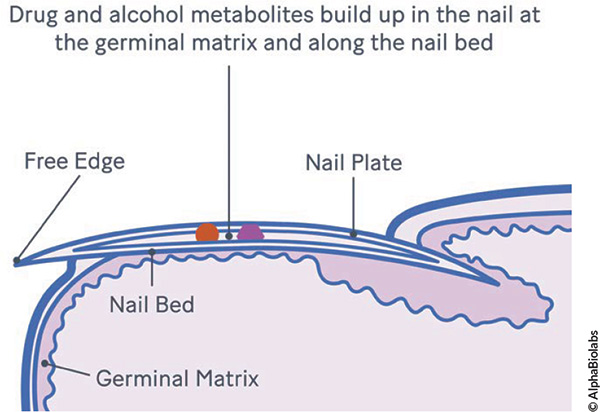*/
As a leading provider of UKAS-accredited drug and alcohol testing, and a trusted training partner of the Judicial College, AlphaBiolabs recently had the opportunity to deliver a session on drug and alcohol testing to over 80 members of the judiciary.
Among the many insightful discussions that took place, there was a noticeable interest in alternative testing methods to complement hair testing – particularly nail testing.
Here, we take a closer look at nail drug and alcohol testing, its evidential value and how it can be used to support or enhance other toxicology evidence.
Nail testing is a toxicological method used to detect drug use or, in the case of nail alcohol testing, to monitor abstinence or chronic and excessive alcohol consumption over an extended period.
When a person consumes drugs or alcohol, these substances and their metabolites enter the bloodstream and become embedded in the keratin fibres of the nails as they grow.

Once deposited, these markers remain stable, providing a retrospective overview of substance use.
Nail testing is especially useful when hair testing is unavailable or unsuitable. Common scenarios include:
In such instances, nail testing provides a robust alternative. It is also highly relevant in child protection cases, where long-term patterns of drug or alcohol use need to be evidenced swiftly to inform safeguarding decisions.
While nail testing can be conducted independently, its evidential power is amplified when used in conjunction with other testing methods. Combining nail drug or alcohol testing with hair, blood, urine or oral fluid analysis allows legal professionals to:
In alcohol testing, nail samples can complement blood biomarker testing – such as phosphatidylethanol (PEth) – to build a multi-source profile of alcohol use (proof of abstinence or supportive of chronic and excessive use). This is particularly valuable in care proceedings where establishing long-term parental behaviour is critical.
As toxicological science evolves, it’s essential for the legal profession to remain up to date on the full range of testing options available, particularly when decisions in court can have far-reaching consequences for families.
Nail testing offers a reliable means of evidencing long-term substance use and is effective as:
As a leading provider of UKAS-accredited drug and alcohol testing, and a trusted training partner of the Judicial College, AlphaBiolabs recently had the opportunity to deliver a session on drug and alcohol testing to over 80 members of the judiciary.
Among the many insightful discussions that took place, there was a noticeable interest in alternative testing methods to complement hair testing – particularly nail testing.
Here, we take a closer look at nail drug and alcohol testing, its evidential value and how it can be used to support or enhance other toxicology evidence.
Nail testing is a toxicological method used to detect drug use or, in the case of nail alcohol testing, to monitor abstinence or chronic and excessive alcohol consumption over an extended period.
When a person consumes drugs or alcohol, these substances and their metabolites enter the bloodstream and become embedded in the keratin fibres of the nails as they grow.

Once deposited, these markers remain stable, providing a retrospective overview of substance use.
Nail testing is especially useful when hair testing is unavailable or unsuitable. Common scenarios include:
In such instances, nail testing provides a robust alternative. It is also highly relevant in child protection cases, where long-term patterns of drug or alcohol use need to be evidenced swiftly to inform safeguarding decisions.
While nail testing can be conducted independently, its evidential power is amplified when used in conjunction with other testing methods. Combining nail drug or alcohol testing with hair, blood, urine or oral fluid analysis allows legal professionals to:
In alcohol testing, nail samples can complement blood biomarker testing – such as phosphatidylethanol (PEth) – to build a multi-source profile of alcohol use (proof of abstinence or supportive of chronic and excessive use). This is particularly valuable in care proceedings where establishing long-term parental behaviour is critical.
As toxicological science evolves, it’s essential for the legal profession to remain up to date on the full range of testing options available, particularly when decisions in court can have far-reaching consequences for families.
Nail testing offers a reliable means of evidencing long-term substance use and is effective as:


The Bar Council is ready to support a turn to the efficiencies that will make a difference
By Louise Crush of Westgate Wealth Management
Marie Law, Director of Toxicology at AlphaBiolabs, examines the latest ONS data on drug misuse and its implications for toxicology testing in family law cases
An interview with Rob Wagg, CEO of New Park Court Chambers
What meaningful steps can you take in 2026 to advance your legal career? asks Thomas Cowan of St Pauls Chambers
Marie Law, Director of Toxicology at AlphaBiolabs, explains why drugs may appear in test results, despite the donor denying use of them
The appointments of 96 new King’s Counsel (also known as silk) are announced today
Ready for the new way to do tax returns? David Southern KC continues his series explaining the impact on barristers. In part 2, a worked example shows the specific practicalities of adapting to the new system
Resolution of the criminal justice crisis does not lie in reheating old ideas that have been roundly rejected before, say Ed Vickers KC, Faras Baloch and Katie Bacon
With pupillage application season under way, Laura Wright reflects on her route to ‘tech barrister’ and offers advice for those aiming at a career at the Bar
Jury-less trial proposals threaten fairness, legitimacy and democracy without ending the backlog, writes Professor Cheryl Thomas KC (Hon), the UK’s leading expert on juries, judges and courts